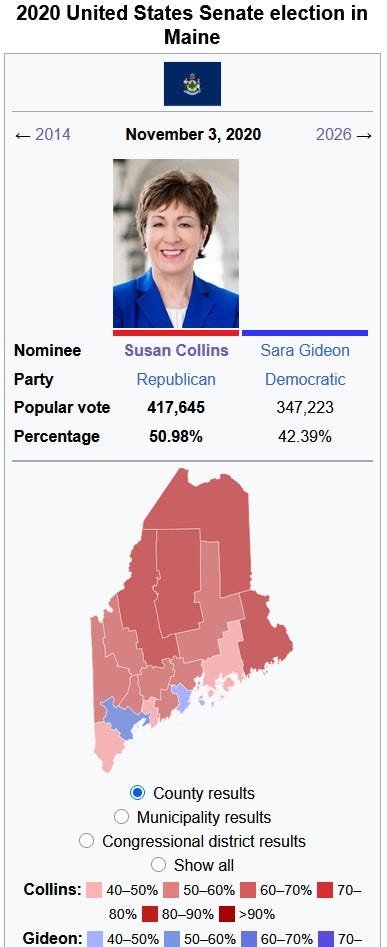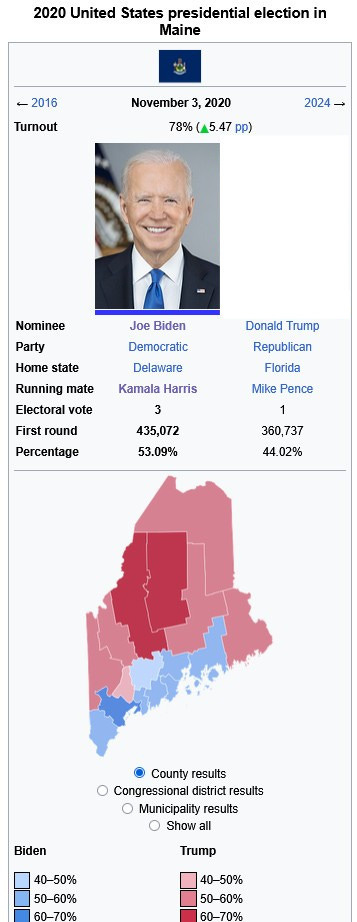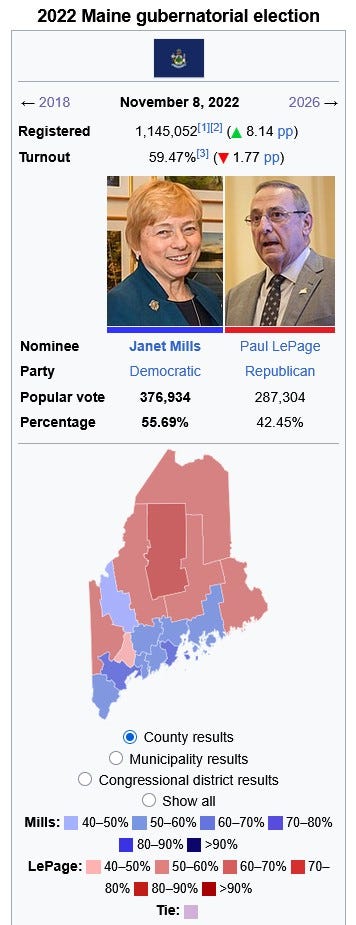Governor Janet Mills of Maine Should Run For U.S. Senate in 2026
A completely and totally 100% biased political post. Non-U.S. readers, please forgive the deep dive into domestic politics!

I’m Sam Matey, writer of The Weekly Anthropocene. I travel a heck of a lot these days, but my home is the U.S. state of Maine. And as I’ve written before, I have long been a huge fan of the incumbent Governor of Maine, Janet Mills.
In 2018, I first met then-Attorney General Mills in person at a protest in Augusta calling (unsuccessfully, as it would turn out) for Senator Susan Collins to vote against Trump’s Supreme Court nominee. That year, I wrote an op-ed in favor of Janet Mills for Governor that got quoted by the campaign, and was lucky enough to publish an interview with then-gubernatorial nominee Mills in my then-minuscule newsletter. I was (barely) too young to vote for her in that election, but I was very glad that she won.
As Governor of my state, Janet Mills exceeded my highest expectations — despite inheriting a deeply dysfunctional state government and political situation left by the corrupt outgoing Governor. As a teenage volunteer in Madagascar, I thrilled to read the story of the new governor’s pro-climate action speech to the United Nations. Her deeds would match her words. When I wrote my call for her re-election in 2022, Mills’ first-term accomplishments alone were truly exceptional.
“She’s been a pioneer on climate action.
She’s expanded Medicaid to cover over 89,000 Mainers previously without health insurance,
She’s expanding broadband across rural Maine,
She’s leading us through the pandemic with among the nation’s lowest death rates and fastest vaccine rollout,
She’s led the passage of strong economic relief to support Mainers after the pandemic, and
She’s using American Rescue Plan funds to invest in building Maine’s infrastructure and workforce for the future with her magisterial Maine Jobs & Recovery Plan.”
—The Weekly Anthropocene on Janet Mills, October 2022.
I volunteered my professional services to the Janet Mills re-election campaign in 2022. That year, I proposed and led the project of creating an interactive GIS web map of some of the work she’d done for the people of Maine in her first term. It’s still up.
The Portland Phoenix called that map “the dorkiest thing ever done by a large-scale campaign in Maine,” part of a “cult of competency.” I still treasure the compliment.


In her second term, I successfully pitched a new, non-campaign, paid-work project inspired by that map: online GIS dashboards of the amazing work that Maine was doing on climate action and resilience. I then worked with the Maine Governor’s Office of Policy Innovation and the Future, an executive-branch agency established by Janet Mills, to create those dashboards (here’s my summary). From time to time, I still do some paid GIS consulting work to update these collections of informational maps.
So when I propose that Janet Mills should run for the U.S. Senate in 2026, I am incredibly biased in her favor on a number of levels. Apart from her amazing competence and successful leadership, she has directly helped me personally advance in my career on several fronts. She gave a teenage writer a lengthy interview and then listened to an ambitious twenty-something GIS consultant’s unprecedented ideas for several public-facing map projects. I know I’m biased. But I’m also right.
Even assuming free and fair elections in the United States in 2026 (not a certainty these days), the 2026 Senate map is highly unfavorable to Democrats. The party opposing Trump’s cult-of-personality cosplay autocracy currently holds 47 out of 100 seats in the Senate. They would need 4 more seats to win a majority of 51 that could beat tiebreaker Vice President Vance — and prevent the confirmation of any more of President Trump’s toadying cabinet nominees or Constitution-eroding federal judges.
But winning a Democratic Senate majority in 2026 does not look very probable right now, to say the least. Even assuming an anti-Trump national environment that would likely deliver a House of Representatives majority to the Democrats (again not a given, though the manifest incompetence on display daily makes me think it pretty likely), the Senate map that year is really rough, as explained in-depth by this article.

“They need to win four seats to secure a majority, of which the most promising on paper is Maine, because Kamala Harris won Maine. But Susan Collins is incredibly hard to beat…
…if Trump is unpopular and Republicans lose the House in the midterms, while the GOP retains control of the Senate, Trump can keep stocking the judiciaries with hand-picked lackeys who help him shred American democracy. And that doesn’t seem like a great outcome.”
—Political writer Matt Yglesias
I think it is imperative for the future of the United States of America, and indirectly the world, that the Democratic Party puts forth its strongest possible candidate for every Senate seat in 2026. Maine is one of the best available opportunities — perhaps the very best — to win a Senate seat away from the political party that has kowtowed to a man who would be king.
But Incumbent Republican Senator Susan Collins is objectively a very skilled and formidable politician. Even if Trump’s chaos reaches “empty shelves at Walmart” levels by 2026, Collins might still be a favorite to win. She’s the only Republican to win statewide in Maine since 2014 (and the only Republican elected to Congress from any of the six New England states since 2018). Senator Collins has held her seat since 1997, and she has developed a very strong personal brand.
Maine Democrats, including me, have learned this the hard way. In 2020, amid Trump’s grotesque mismanagement of the COVID pandemic response, Collins was viewed as vulnerable. Democrats nominated Speaker of the Maine House Sara Gideon, who had helped Governor Mills pass much of her progressive agenda through the state legislature. I donated some of the income from my first job to the Gideon campaign and spent hours campaigning for Sara Gideon by calling potential voters.

I was disappointed. In 2020, Maine was the only state in America to simultaneously vote for a Republican for the Senate and a Democrat (Joe Biden) for President. In my home state that year, Collins won over Gideon by 51% to 42%, while Biden won over Trump by 53% to 44%.

That’s a gigantic 17% of the state electorate that voted for both Biden (a Democrat) for President and Collins (a Republican) for Senate on the same day on the same ballot in 2020. A lot of people did this!
Based on my personal experience of Maine and the state’s objective electoral history, I think it all too probable that even in a strongly anti-Trump environment in 2026, Susan Collins could end up retaining the Maine Senate seat for the Republican Party. I would consider a Collins victory highly likely if the Democrats end up nominating one of many potential candidates from the more liberal southern coast of Maine, where the Democratic Party is stronger and their “back bench” of local elected officials is deeper. Northern Maine has a very distinct regional identity, and successful Maine statewide politicians (including both Susan Collins and Janet Mills) tend to come from the more conservative northern inland areas of Maine, increasing their appeal to those key voters.
Collins has a proven record, one that really nobody else in America can match, of winning over a large slice of anti-Trump voters to support a Republican for Senate.
Just thinking out loud here, but if I were the Democratic Party hoping to unseat Collins in 2026, I’d be looking for a Maine candidate with a proven record of winning over a large slice of pro-Trump voters to support a Democrat for statewide office.
Janet Mills won re-election in 2022 by 55.69% to 42.45% — a stupendous 13-point margin, larger than Collins’ margin of victory in 2020. In the highly polarized landscape of 21st-century American politics, winning with over 55% of the vote counts as an incredibly massive landslide victory, especially in a competitive state like Maine. For context, Barack Obama in 2008 won the presidency with less than 53% of the vote.
Case closed, your honor. If we want a chance to win: Janet Mills for Senate in 2026!
If I do say so myself, that’s a pretty dang impressive case for a Janet Mills Senate candidacy in 2026, and I very probably would have written a version of this article ending about here if that’s all there was to it.
But there’s one other episode — you may have heard the story— that makes me absolutely certain that Janet Mills is the candidate we need to meet this moment in American history.
“I’m complying with state and federal law.” — Janet Mills.
“Well, we are the federal law. You’d better do it. You’d better do it, because you’re not going to get any federal funding at all if you don’t.” — Donald Trump.
“See you in court.” — Janet Mills.
— Public interchange at the White House, February 2025
The sitting U.S. president threatened to illegally withhold all federal funding to the state of Maine unless Governor Mills complied with an executive order that she believed to be a violation of the Maine Human Rights Act.
The Trump Administration then ordered a series of blatantly politically motivated and completely illegal acts to “punish” the state of Maine for non-compliance with this “royal command.” Among them was a freeze, without due process, of $3 million worth of congressionally allocated Department of Agriculture funds. The Maine Department of Education suddenly became unable to access federal nutrition funds meant to help feed 172,000 Maine children.
This was only a minor news item, one small part of the ongoing all-out attack on America’s civil liberties, functional government, and free society. Under any normal presidential administration, this would have been a horrific scandal. In 2025, it was one casual cruelty among many. But with this one, the targets fought back.
Maine and Governor Mills stood their ground for the rule of law, and filed a lawsuit.
“No President — Republican or Democrat — can withhold Federal funding authorized and appropriated by Congress and paid for by Maine taxpayers in an attempt to coerce someone into compliance with his will.
It is a violation of our Constitution and of our laws, which I took an oath to uphold….
In America, the President is neither a King nor a dictator, as much as this one tries to act like it — and it is the rule of law that prevents him from being so….
This is about whether a President can force compliance with his will, without regard for the rule of law that governs our nation.
I believe he cannot.”
—Governor Janet Mills, written statement, February 2025.
In April 2025, a federal judge granted a restraining order to halt the illegal funding freeze. Then, in May 2025, the news came that the Trump Administration’s Department of Education had settled in court — likely after it got through to them that they had no case. The terms of the settlement were reportedly that “the agency agreed not to freeze, terminate or interfere with the state’s access to USDA funds…without going through the legally required process.”
“It’s good to feel a victory like this!
I stood in the White House and when confronted by the president of the United States, I told him I’d see him in court.
Well, we did see him in court, and we won.”
— Governor Janet Mills of Maine, May 2025.
She’s a fighter. She stood firm to defend the children of her state (plus basic legal and moral principles!) against egregious abuses of power. She gave hope that the rule of law still mattered, and that not every elected official in America had given up on that.
And she won. The children of Maine will be fed, without bending the knee to a disgusting autocrat-aping bully.
The thing is, Janet Mills is an actual leader leader, not a social media-driven performer-leader. The kind of person you could envision trusting with your life if it came down to it. Maine is a small state, and candidates meet a lot of voters in person. Even in the crazy meme-driven attention economy of 2020s America, Mainers see that in her.
There are several other strong Democratic candidates in Maine that could possibly run for and win for this Senate seat in 2026. Off the top of my head, incumbent Congresswoman Chellie Pingree of Maine’s 1st Congressional District springs to mind (check out my interview with her!) and of course lesser-known political talent might arise and meet the moment. But there’s no other candidate with the demonstrated statewide victory record, broad-based public appeal, impeccable record of state-level governance, county-by-county backlist of kitchen-table and town-economy level wins for working families, universal name recognition, spine of steel1, and record of winning in court against America’s weak-willed wannabe dictator.
In this political moment, factional differences on points of policy are comparatively unimportant — trivial, even. What matters right now is winning against the bad guys. Policy issues can be settled and lobbied for after that. We need to laser-focus on nominating the candidates best positioned to win.
If any Democrats really want a shot at beating Susan Collins in 2026, Janet Mills is their best bet.
If any Americans want to maximize the odds of reestablishing an independent legislative branch to bring some decency and sanity back to this country’s governance, Janet Mills is their best bet, too.
The state of Maine, and the future of democratic governance in the American Republic, need Janet Mills to run for U.S. Senate in 2026.
I have faith that she won’t back down from this challenge.
A literal spine of steel. As is public knowledge, Governor Mills underwent surgery as a teenager that inserted rods in her vertebral column to treat severe scoliosis. There is actual steel in her physical spine. Sometimes actual facts are just too poetic to be remotely realistic.












No problem with the deep dive. As a Granite State neighbor, and as an American, I hope you're right about her running.